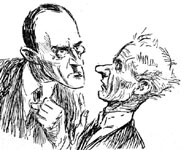
Will the Church Be Persecuted or Dominant?
REFLECTIONS OF A PRESBYTERIAN
Broadly speaking, the church in relation to society (taking “church” in the most inclusive sense of that word) may be either dominant or persecuted. There need be no officially “established” religion for the church to be in effect dominant, nor need religion be technically illegal for the church to be in effect persecuted. The church may guide society according to its values — or society may pre-empt the church.
When the church is dominant, the greater portion of society is “churched,” that is, connected to or influenced by the teachings of Christ through His church. Some people, of course, are only nominally Christian, and as a whole the body can be somewhat tepid rather than burning with passion for Christ. When the church is less influential, when most people have no primary connection to it, then though the church will have far fewer members, those will generally be members of greater zeal and commitment. And by reason both of their small numbers and their notable zeal, which others may find “offensive,” those still churched can begin to be persecuted in ways more or less subtle.
And which is better, for society and for the church: carloads of nominal Christians or a handful of zealous believers? Here in Oregon’s Willamette Valley, my fellow Presbyterians and I, as we see our values receding into ineffectuality in society and as we begin to feel hints of persecution, are asking ourselves the question. So far as we can gather, conventional Christian wisdom would favor the small but passionate church. The reasoning goes like this: (1) Power corrupts, so the church shouldn’t have any temporal power. (2) Even with temporal power, the church can’t force people to be good, and goodness is a primary goal. (3) The early church — before Constantine established Christianity as the religion of the empire — was much closer to the Holy Spirit. (4) Being persecuted is good for Christians because it eliminates the temptation to be too close to the world. (5) Theocracy (or anything like it) is a bad thing, and surely in our day we can’t take such an idea seriously.
So, discussion over, right? Not quite. For we Presbyterians, prompted by several recent trends, are beginning to rediscover our history and to see that this discussion is still pertinent. Why have we begun to look beneath the surface of our religious routine and back through the dusty volumes that hold our history? For one thing, we see before our eyes a rising paganism — sometimes connected with environmentalism — that claims to have more ancient roots and greater mystical substance than Christianity. Can the new pagans be correct about their superiority? Some of us Christians have begun to look back to the history of our faith to try to find out.
You May Also Enjoy
The French Side of Henry James... Social Catholicism in Europe: From the Onset of Industrialization to the First World War... Following Christ in a Consumer Society: The Spirituality of Cultural Resistance
Father Maciel: Scorned By His So-Called 'Leaders'... Once a Legionary... Divorce is Like Murder: The First One is the Hardest... Catholic Evangelization on EWTN... The New Infidels of Europe... A Korean War Veteran Speaks... The 'Faithful Remnant' Is Not a New Idea...
TV news is becoming the best place to tell our story. It offers opportunities for believers to express their faith in a prime time context.

